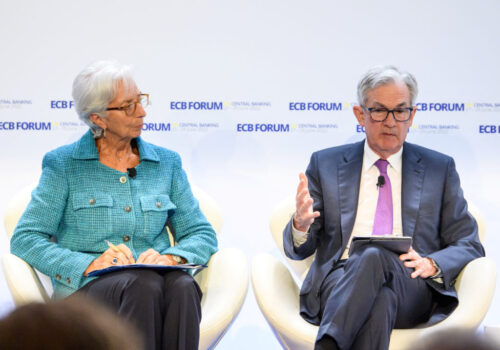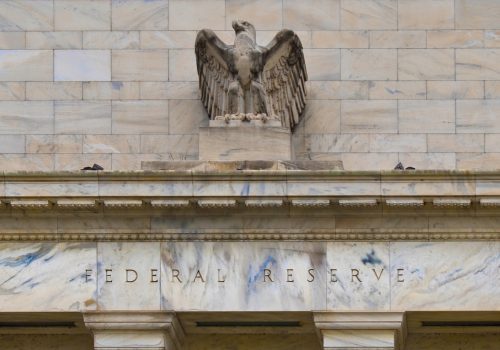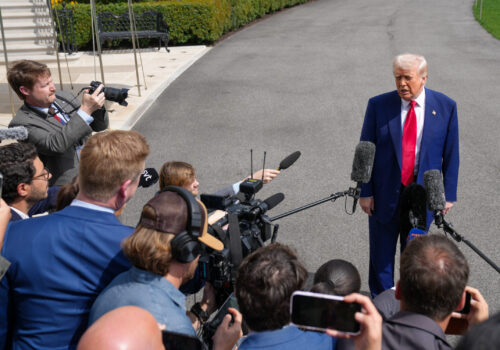Trump’s challenges to the Fed’s independence loom over Jackson Hole Symposium
Earlier today, US President Donald Trump said he would fire Federal Reserve Governor Lisa Cook if she does not resign from her position. Cook has come under fire following allegations that she falsified mortgage application statements. This marks the latest escalation in the Trump administration’s ongoing campaign to challenge the independence of the US central bank.
Around the world, central banks are facing political pressure as they confront the economic aftershocks of the pandemic and grapple with tight fiscal constraints and new sources of inflation. But this level of political pressure is rare, if not unprecedented, in the United States and is casting a shadow over the Fed’s major conference in Jackson Hole this week.
Political pressure mounts on the Fed
Since the beginning of his term, Trump has repeatedly attacked Federal Reserve Chair Jerome Powell for maintaining interest rates at their current level, as the president believes they should be reduced (although he has backed off that call recently). The Fed has held rates steady since December, largely in response to the inflationary effects of tariffs. Powell noted that the Fed went on hold when it “saw the size of the tariffs, and essentially all inflation forecasts for the United States went up materially.” At Jackson Hole, Powell said that changing economic factors “may warrant” interest rate cuts, but he did not signal when.
Despite Powell’s refusal to resign from his position before it ends in May 2026—as Trump has demanded that he do—the president has already had the opportunity to influence the Federal Open Markets Committee, which sets interest rates. Following Adriana Kugler’s surprise resignation this month as one of the governors of the Federal Reserve Board, Trump appointed his chairman of the Council of Economic Advisers, Stephen Miran, to temporarily fill her seat. Cook’s term, however, does not expire until January 2038—unlike Kugler’s, which would have expired in January next year. If Trump were to successfully remove Cook, he would get another opportunity to install his own pick on the Fed’s seven-member board.
A global perspective on central bank autonomy
As the GeoEconomics Center predicted early this year, the debate over central bank independence has emerged as a defining theme of 2025. In response to post-pandemic inflation, central banks have tightened monetary policy—slowing growth, increasing unemployment, and straining public finances. These effects have triggered significant political backlash.
But the institutional frameworks protecting central bank governors from political interference vary dramatically across major economies. The chart below compares which of the Group of Twenty’s (G20’s) elected leaders can unilaterally dismiss their central bank chiefs.
Most advanced economies—including Australia, Japan, the United Kingdom, and the eurozone—have established strong legal safeguards that require legislative approval for dismissals. By contrast, the United States finds itself in a more precarious position, alongside countries such as Canada and Turkey. Under US federal law, the president may only remove the Fed chair “for cause”—a provision widely interpreted to refer to misconduct, not policy disagreements. However, this protection has never been definitively tested. The closest precedent dates back to 1965, when President Lyndon B. Johnson asked the Justice Department whether he could dismiss then-Federal Reserve Chair William McChesney Martin amid monetary-policy clashes during a period of rising inflation and escalating costs associated with the Vietnam War.
The economic case for independence
There is strong historical evidence that central bank independence correlates with lower inflation. Apart from that, the Fed’s autonomy is crucial for maintaining global confidence in US institutions. That credibility supports the dollar’s role as the world’s reserve currency and anchors financial market stability.
Threats to that independence carry real consequences. In April, when Trump declared that Powell’s termination “cannot come fast enough,” the dollar fell sharply—prompting him to quickly walk back the statement.
Countries that have compromised central bank independence—from Turkey to Argentina—have experienced currency volatility, capital flight, and higher inflation. While the United States enjoys unique advantages with the dollar’s reserve status, these privileges are not guaranteed. There is a growing risk of fiscal dominance, when government fiscal pressures dictate or constrain a country’s monetary policy. High debt and rising borrowing costs could pressure central banks to keep interest rates below what inflation warrants to sustain government spending. Investors worry this would weaken the Fed’s ability to prioritize price stability, making inflation harder to control. If central bank monetary policies bend to the government’s fiscal needs, inflation could resurge, and long-term yields could climb even higher.
As Trump tests the limits of what he can do, the credibility of the Fed—and by extension, global financial stability—is increasingly at risk.
Alisha Chhangani is an assistant director at the Atlantic Council’s GeoEconomics Center.

At the intersection of economics, finance, and foreign policy, the GeoEconomics Center is a translation hub with the goal of helping shape a better global economic future.
Further reading
Thu, Jun 19, 2025
Hawks vs. doves: The split between the Fed and the ECB
Econographics By Bart Piasecki
While the ECB signals an end to its rate-cutting cycle, the Fed hesitates. This article explores the macroeconomic and policy reasons behind it.
Mon, Mar 20, 2023
The Federal Reserve’s dilemma: Choosing between monetary policy and financial stability
Econographics By Barbara C. Matthews
The monetary-policy challenge that the Fed faces now cannot be overestimated.
Tue, May 27, 2025
What’s the Trump administration’s dollar strategy? It depends on who you ask.
New Atlanticist By Alisha Chhangani
Within the White House, there appear to be competing and fractured views of the dollar’s role. This dissonance could result in harm to the currency’s long-term dominance.
Image: European Central Bank President Christine Lagarde, Federal Reserve Chairman Jerome Powell, Bank of Japan Governor Kazuo Ueda and Bank of England Governor Andrew Bailey walk as they attend the Federal Reserve Bank of Kansas City's 2025 Jackson Hole economic policy symposium on August 22, 2025. Photo via REUTERS/Jim Urquhart.


